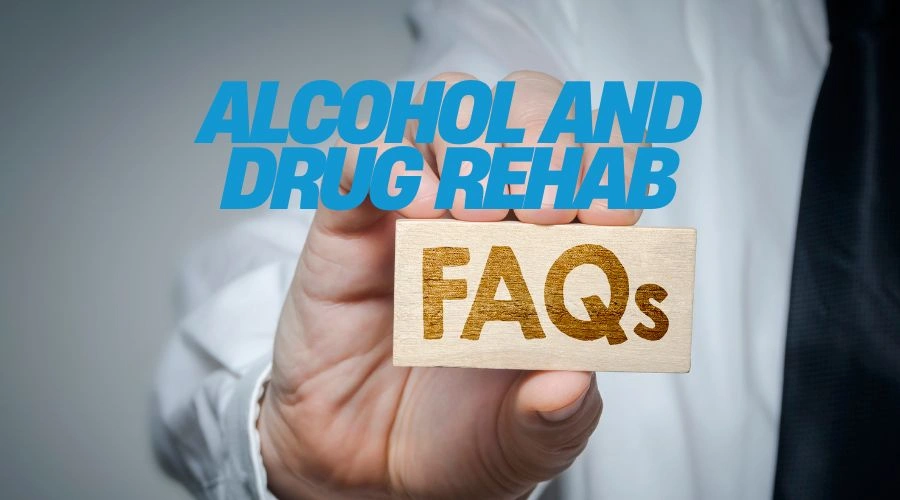Journaling Practices and Prompts for Managing OCD
Our OCD journal prompts can give you a better understanding of your intrusive, obsessive thoughts and feelings, helping you identify patterns that feed the cycle of obsessive-compulsive disorder (OCD). They don’t replace therapy or fix all your OCD challenges, but writing in a journal is an excellent coping mechanism for those seeking an effective mindfulness technique.
The mental health professionals at Icarus Behavioral Health Idaho know how helpful a daily journaling routine can be for people struggling with the distressing thoughts and feelings of OCD. Writing in a journal helps promote self-reflection and self-expression. But it is also a beneficial tool to relieve stress that can trigger the OCD symptoms and compulsive behaviors.
We invite you to download our pages and use our guided journal prompts to gain deep insight into your OCD and how it impacts everyday life. For maximum impact, share these completed pages with your counselor.
Get Accredited Treatment Programs at Icarus Idaho
Journaling: A Mindfulness Technique for Better Mental Health
OCD management requires daily self-care. Some write poetry, do yoga, or try other coping strategies to help find inner peace in the present moment. Others start a journaling journey, which helps them release the mental and physical sensations of OCD. As they describe their thoughts and emotions, they understand more about the things causing distress and learn to manage them.
15 Journal Prompts for Managing OCD Symptoms
You can start your journaling practice from anywhere, giving you a safe space to manage your anxiety levels one compulsion at a time. Print these guided prompts and take them with you to write about your personal experiences whenever you feel that sense of overwhelm begin to creep up on you.
Below, we’ll explain how each prompt helps you better understand managing OCD in daily life. As we discuss each prompt, you’ll follow Liv’s healing journey. ‘Liv’ is learning to manage her OCD. In recovery at Icarus Idaho, she learned which strategies helped and which were less successful—she learned that journaling was the most powerful tool to help her stop intrusive thoughts when feeling anxious.
Of course, your answers will be your own and look very different from Liv’s. However, her responses are similar to many others who share the common theme of her OCD—repetitive activities. Customize your responses; be honest and bold. It can help you take the next step toward living a life free of obsessive-compulsive disorder symptoms.
1. What thoughts have been the most intrusive for me lately, and how do they impact my daily mental wellness?
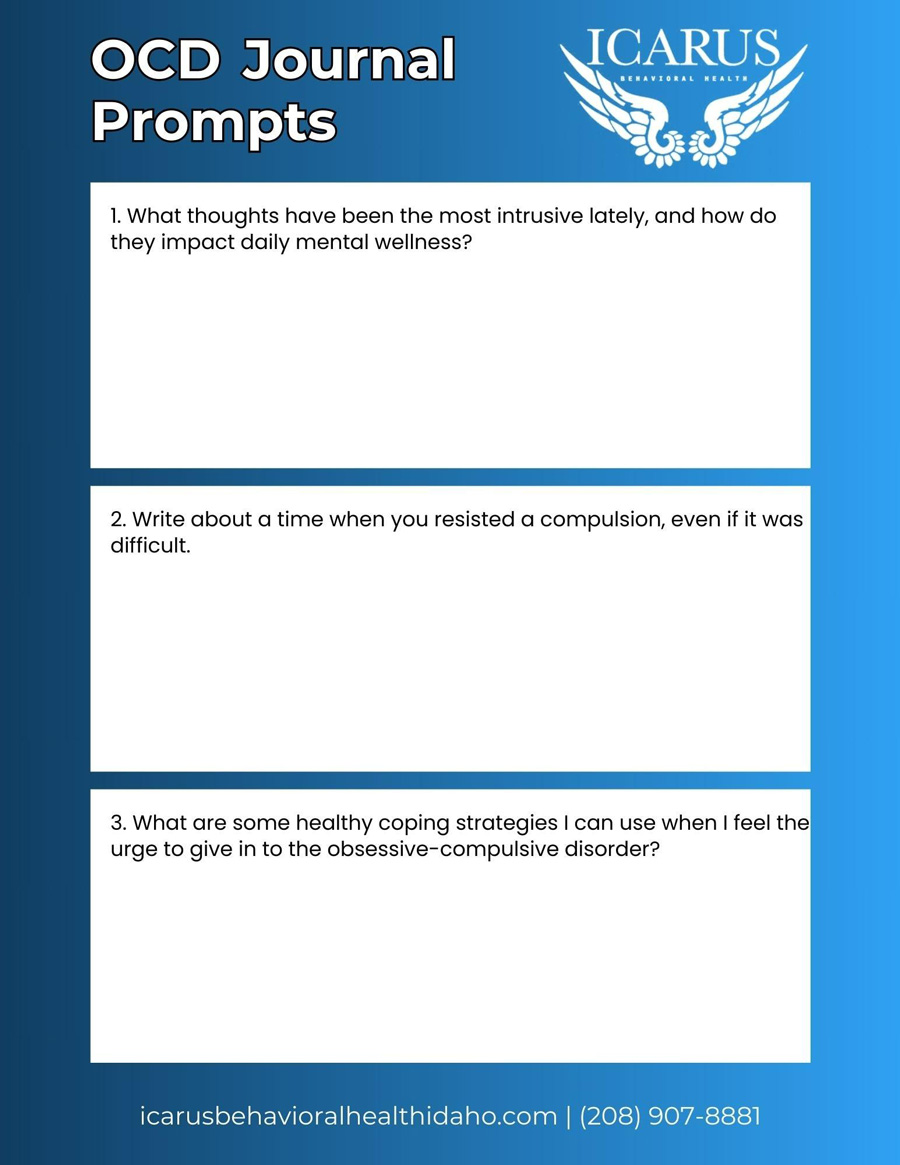
Gaining a better understanding of your intrusive thoughts is the first step in reducing their power over you. This OCD journal prompt helps you become aware of them and connect them to your overall mental health.
Liv’s Example: “Today I worried all day that I’d left on the oven, even though I knew I’d checked clicked the “off” button 3 times. I lost focus all morning and had a raging headache by lunchtime.”
2. Write about a time when you resisted a compulsion, even if it was difficult.
This OCD journal prompt helps you give yourself credit where it’s due. It will boost your self-awareness and help you gain confidence in your ability to solve problems in the future.
Liv’s Journaling Response: “I deliberately avoided rearranging the bed pillows before I went to sleep last night. It caused some anxiety, but I felt proud this morning when I realized that nothing bad had happened because I didn’t give in to that compulsion.”
3. What are some healthy coping strategies I can use when I feel the urge to give in to the obsessive-compulsive disorder?
Celebrating positive experiences is key to helping shift one’s focus away from compulsive behaviors. Understanding that fleeting moments will pass is necessary when managing OCD and building a healthier daily routine.
Liv’s OCD Journal: “I used self-care activities – journaling and a breathing exercise – to calm an intrusive thought today. By the time I completed those two activities, the fear that I’d forgotten to lock the doors had passed.”
4. What cognitive distortions show up in my thinking patterns, and how can I challenge them?
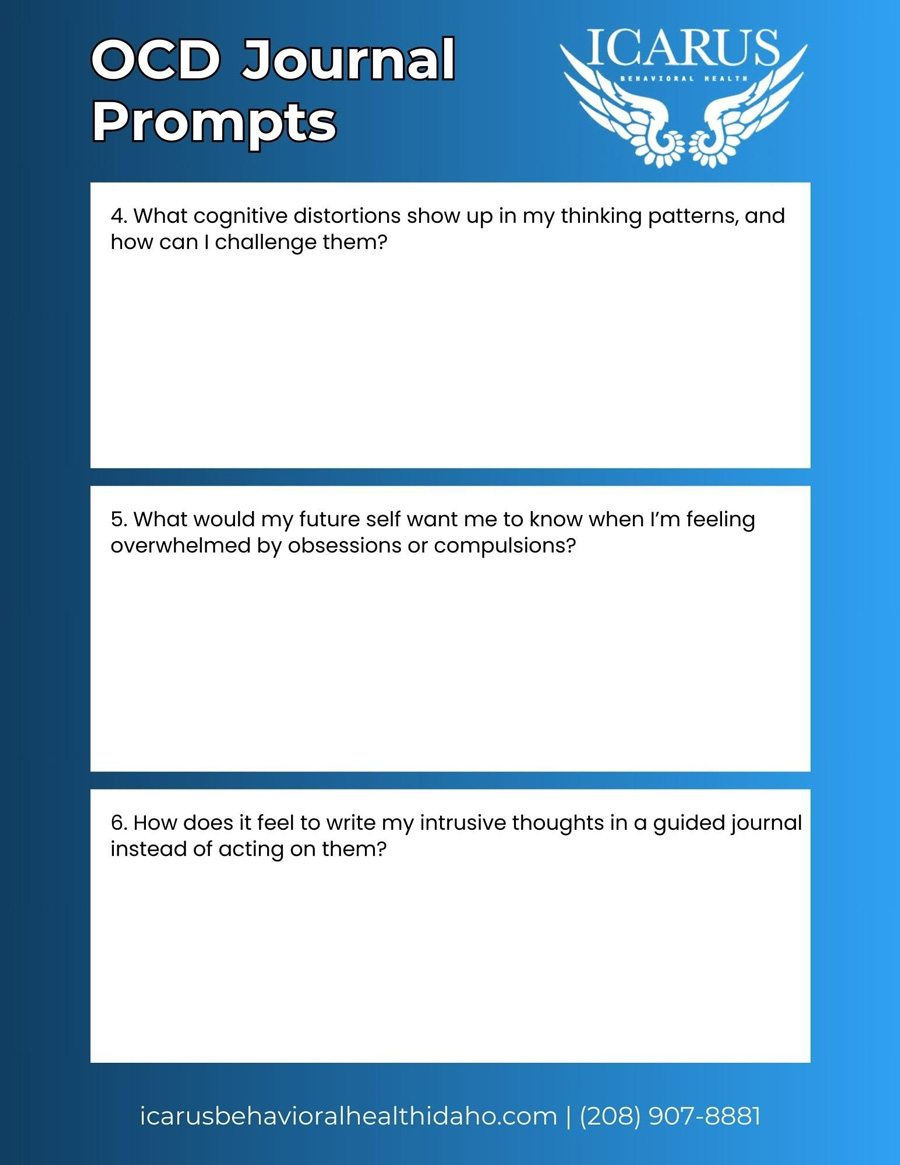
With practice, learning to spot cognitive distortions can help you loosen their hold over your daily life. This OCD journal prompt supports you on this journey of self-discovery and promotes finding solutions to problems.
Liv’s Example Response: “I fear that if I don’t act on my intrusive thoughts, something bad will happen. I constantly tell myself that these fears are not real – it’s just the obsessive-compulsive disorder lying to me.”
5. What would my future self want me to know when I’m feeling overwhelmed by obsessions or compulsions?
This journal prompt invites you to connect with yourself in the future. It signals a subtle shift from fear to hope for a better life ahead. Envisioning your future requires self-awareness and a positive mindset.
Liv’s Journal Prompt Response: “I’d like to tell myself that the feelings and emotions of OCD eventually pass. I’ve handled hard days and don’t need to act on every anxious thought.”
6. How does it feel to write my intrusive thoughts in a guided journal instead of acting on them?
Using obsessive-compulsive disorder journaling prompts can break the connection between intrusive thoughts and compulsive behaviors. Journaling allows one to release their feelings of anxiety onto paper. As they write, the person can often work through the emotions without compulsions.
Liv’s Example Response: “When I write down my innermost thoughts, I feel that I’ve let them go. Journaling about my emotions is far less exhausting than performing OCD rituals all day.”
7. What specific situations tend to trigger my OCD symptoms, and what do they have in common?
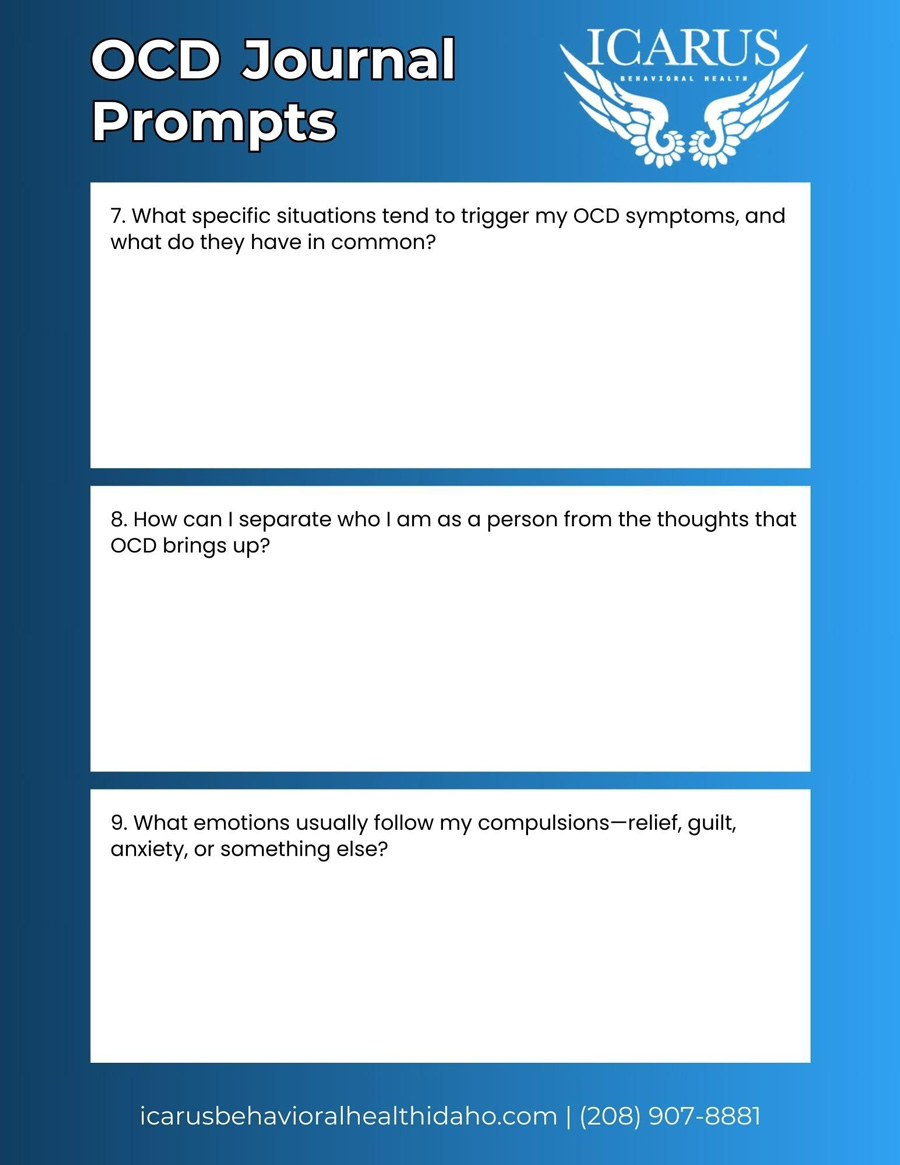
This journal prompt combines self-reflection and strategies to problem solve. When you understand what causes rising anxiety levels, you start to understand how to arm yourself with the proper resources to stop intrusive thoughts from taking over your life.
Liv’s Journal Prompt Response: “High pressure deadlines at work always cause me to have extreme anxiety. The OCD sometimes even causes me to lose sleep, making my emotions worse the next day.”
8. How can I separate who I am as a person from the thoughts that OCD brings up?
You are not your OCD; your OCD is not you. This journal prompt encourages you to view yourself through a lens of self-compassion. You will consider that OCD is a disease – a mental health disorder listed in the DSM-5 Diagnostic Manual. You did nothing wrong and are worthy of getting help.
Liv’s Journal Entry: “I have scary thoughts that have led to intense anxiety and OCD. But I’m not a bad person. I’m kind to my loved ones and doing my best in life.”
9. What emotions usually follow my compulsions—relief, guilt, anxiety, or something else?
When you describe the fallout that happens after a cycle of intrusive thoughts and compulsive behaviors, you discover the true impact OCD has on your life. This journal prompt helps you strengthen emotional intelligence and mindfulness about your behaviors.
Liv’s Journal Prompt Response: “When I complete a compulsion, I feel relief for a short time. But when the exhaustion kicks in, it can feel like a roller coaster ride I never wanted to take.”
10. When do I feel most safe and grounded, even if OCD is present?
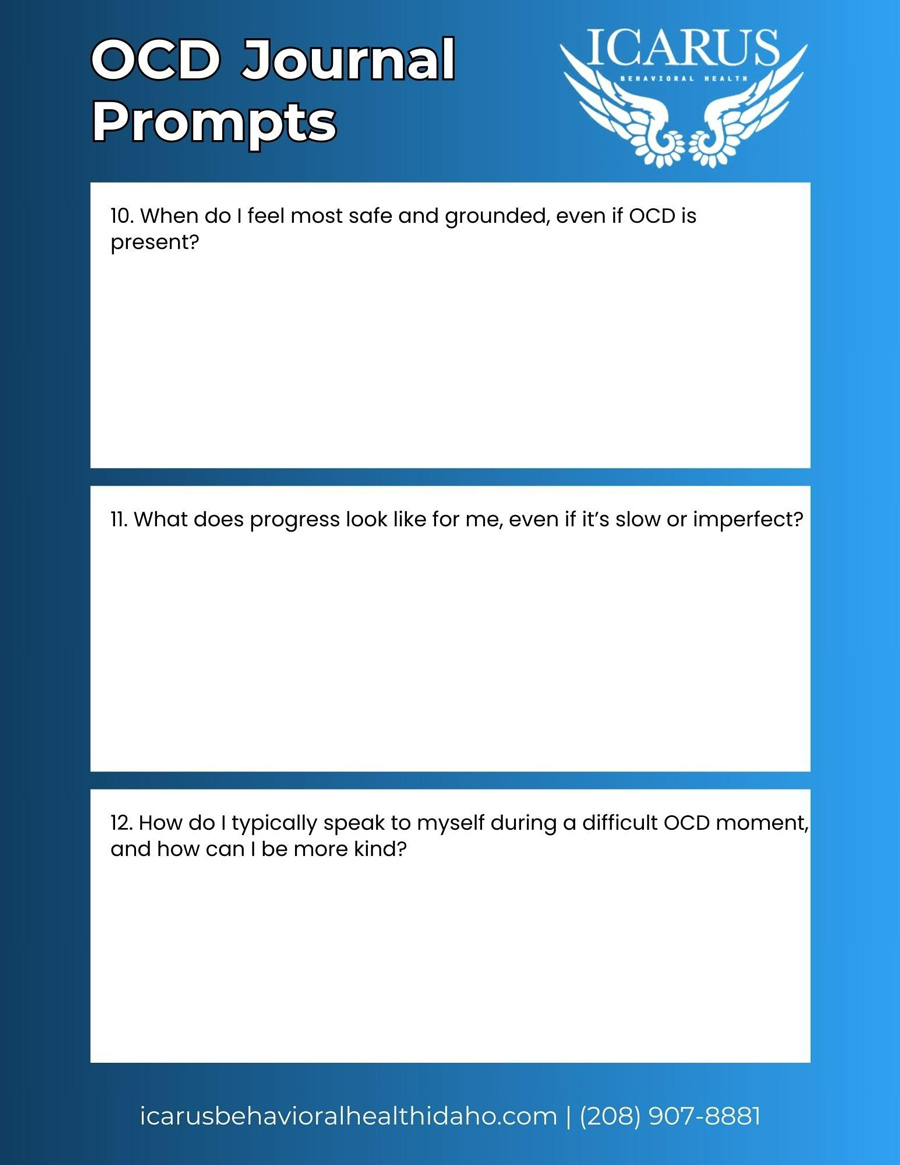
This journaling prompt focuses on creating a positive mindset and gratitude for safety. When you write about times when you felt protected and secure, you may actually describe a time when you successfully self-soothed—that’s a strategy to duplicate!
Liv’s OCD Journal Entry: “I feel at my calmest when I sit wrapped in a soft blanket on my bed meditating. When the intrusive thoughts are loud, it helps me to escape to this private space to do gratitude meditation.”
11. What does progress look like for me, even if it’s slow or imperfect?
Making lasting changes means adopting a growth mindset while discouraging perfectionism. Remember the adage, “Rome wasn’t built in a day.” It took centuries to build all those magnificent structures – and it will take you, too, time to put up fortifications against OCD.
Liv’s OCD Journal: “I know I’m making progress when I can delay a compulsion for 5 minutes. When I take time to write about how I feel, the impulse to act usually decreases. That’s real progress for me.”
12. How do I typically speak to myself during a difficult OCD moment, and how can I be more kind?
The words you use to describe yourself or talk to yourself matter. This journal prompt reminds you to reframe negative thoughts and respectfully speak to yourself. You deserve self-compassion.
Liv’s Journaling: “When I feel anxious, I describe myself as a weak person. I will start saying, ‘You’re doing your best and that’s enough,’ instead.”
13. What boundaries can I set to support my mental health when OCD feels overwhelming?
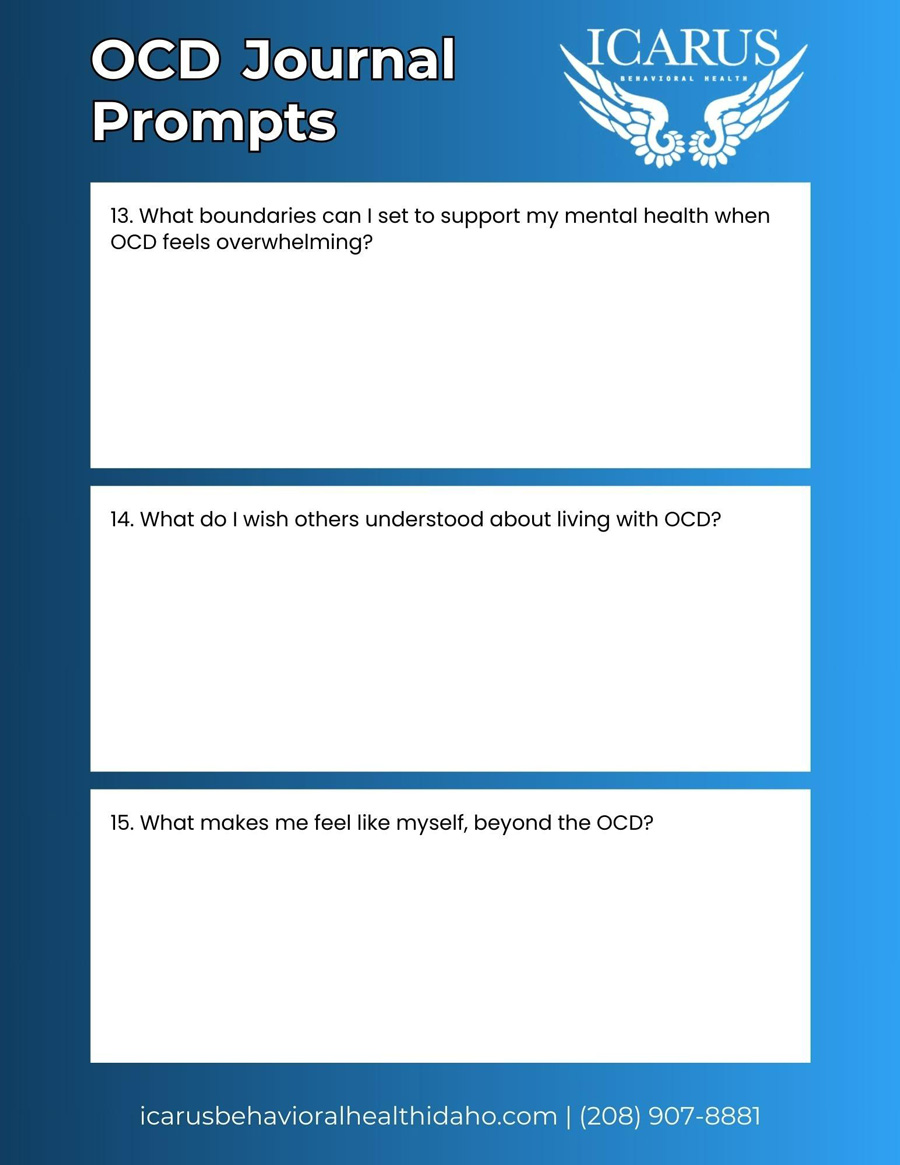
Setting boundaries with loved ones gives you room to breathe. Those who want to be part of your support system have good intentions but must know what helps and what doesn’t. It’s up to you to set the tone.
Liv Writes: “I am happy for my family’s support, but I had to tell them that constantly discussing my mental health keeps focus on negative things instead of promoting gratitude and a peaceful mindset.”
14. What do I wish others understood about living with OCD?
This journaling prompt can help you clearly explain what you’re going through. A clear explanation can help you get the support and resources you need. You’ll also be better prepared to have helpful discussions about your OCD with trusted friends and family members.
Liv’s Journaling Entry: “I wish people understood that constantly cleaning isn’t really all about keeping a neat space. It’s me trying to feel safe in a brain that won’t stop looping negative, fearful thoughts.”
15. What makes me feel like myself, beyond the OCD?
OCD can shake your confidence and make you feel unworthy. This journaling prompt challenges you to examine your sense of self and renew your self-confidence. As you write your journal entry, consider how the things that reinforce your identity can integrate with your coping skills.
Liv’s Journaling Practice: “Besides journaling, I love writing music and playing my guitar. Those are skills that OCD can’t take away. The music I write helps me remember who I really am, outside of OCD.
Tips for an Effective Mental Health Journaling Routine

If you’re new to using journaling prompts to write, you might feel a little awkward at first. Some clients start out thinking that the journal is just an echo chamber; later, they see it as a form of therapy, like writing love letters to themselves. Here are a few tips for those new to mental health journaling:
- Find a quiet space for reflection. You need to be emotionally and physically safe before you can fully open up to the idea of writing from journal prompts.
- Write without self-judgment or perfection. Your journal is a space free of judgment – it’s for your eyes only, unless you decide to share what you write with others. Don’t worry about perfect spelling or grammar. It doesn’t matter if your thoughts make sense; just follow the prompts and get your ideas onto paper.
- Start with a prompt, then let your thoughts flow freely. Guided prompts are a starting point, but don’t be afraid to go rogue. The goal of mental health journaling is self-expression and stress release.
Up To 100% of Rehab Costs Covered By Insurance
Connect with Icarus Idaho for Professional OCD Treatment
Many people facing obsessive-compulsive disorder find that journaling and self-care alone are not enough to regain control over the OCD cycle. It’s a tricky condition that often requires professional care, usually on an outpatient level.
Icarus Behavioral Health Idaho, located in Boise, works with self-pay clients. We also accept insurance from the top providers to make treatment affordable. If you need a structured environment and professional support for your OCD, call us today. It’s confidential, and we’re always here to help.


